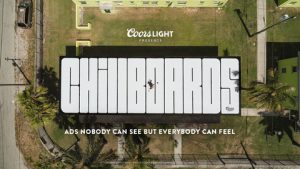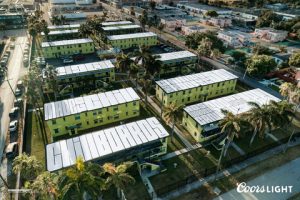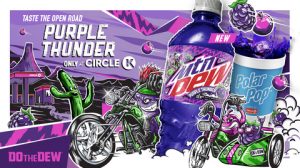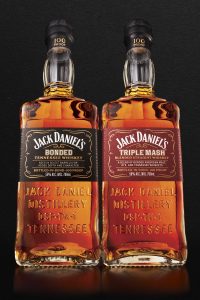Coors Light Energy-Efficient Rooftop Ads Have Chilling Effect
Globally, 2021 was ranked the fifth warmest year on record since 1880, according to the European Union’s Copernicus Climate Change Service. Heat waves are more frequent, and in Miami, there have been more 90-degree days than ever before. Air conditioners are humming non-stop, utility bills are skyrocketing, and overall, it’s just hotter.
 In response, Coors Light has debuted Chillboards, rooftop billboard installations proven to cool buildings down.
In response, Coors Light has debuted Chillboards, rooftop billboard installations proven to cool buildings down.
The minimally branded rooftop installations are located atop apartment buildings in Miami and painted with Mule-Hide Finish reflective white roof coating, a formula proven to reflect 85 percent of sunlight. On one rooftop tested, Coors Light discovered the ad lowered the surface temperature of the roof by as much as 50 degrees. View how it works in this short video.
“The science behind Chillboards is actually pretty simple, dark surfaces absorb sun rays, but specially formulated white coating reflects them, resulting in a cooler temperature,” said Marcelo Pascoa, vice president of marketing for the Coors Family of Brands. “We realize not everyone will be able to paint their roofs white, but we hope to inspire Americans to make choices that reduce energy usage and puts a few dollars back in their pockets.”
 The new rooftop Coors Light ads, which have different phrases such as, “Chillboards” and “Ads Nobody Can See, But Everyone Can Feel,” are written in the typeface “coolest,” designed to cover more than 95 percent of the surface space in reflective white paint.
The new rooftop Coors Light ads, which have different phrases such as, “Chillboards” and “Ads Nobody Can See, But Everyone Can Feel,” are written in the typeface “coolest,” designed to cover more than 95 percent of the surface space in reflective white paint.
“Simple and cost-friendly initiatives like Coors Light Chillboards can have a significant impact on the quality of life for renters and homeowners,” said Jane Gilbert, Miami-Dade chief heat officer. “If more communities started seeing the value of painting roofs white, we could cool down millions worldwide.”
In support of the energy-saving program, Coors Light is giving away 5,000 gallons of roof coating. For more information, visit www.Chillboards.com.
Coors Light worked with Creative Director Set Free Richardson and Street Artist Andulaz The Artist to produce the Chillboards.
In March, Coors Light spearheaded efforts for Molson Coors to move away from six-pack plastic rings by the end of 2025, a move that will eliminate 400,000 pounds of single-use plastic annually. Learn more about Coors Light sustainability agenda.
For more updates on the specialty food industry’s push toward sustainability and corporate responsibility, subscribe to Gourmet News.
MTN DEW Purple Thunder Debuts at Circle K
 MTN DEW Purple Thunder, a new beverage that combines the flavors of blackberry and plum is now only available at Circle K.
MTN DEW Purple Thunder, a new beverage that combines the flavors of blackberry and plum is now only available at Circle K.
“We are thrilled to offer MTN DEW Purple Thunder as an exclusive flavor at Circle K,” said Kevin Lewis, chief marketing officer for Circle K parent company Alimentation Couche-Tard. “Everything from the berry flavor to the design was specially created by MTN DEW and Circle K to provide a unique beverage that is sure to bring a new level of fun and flavor to our customers.”
The soda debuted in 20-ounce bottles and on fountain.
“MTN DEW is on a continuous mission to create the best flavors with the best partners, and we know DEW Nation is going to love the delicious flavor twist of blackberry and plum that Purple Thunder brings to our roster,” said Pat O’Toole, chief marketing officer, MTN DEW. “And, there is no better partner than Circle K to bring this awesome flavor to life.”
The bottle design features its own biker gang of DEW characters – including a plum and blackberry enjoying the sweetest ride of their life.
Keep up with new products by subscribing to Gourmet News.
Jack Daniel’s Launches First Super Premium Whiskey Line Extension in 25 Years
The Jack Daniel Distillery introduces Jack Daniel’s Bonded Tennessee Whiskey and Jack Daniel’s Triple Mash Blended Straight Whiskey as the first two permanent expressions in the brand’s new Bonded Series. The Bonded Series honors the whiskey making excellence of the iconic Jack Daniel Distillery and will be a permanent extension in the Jack Daniel’s Family of Brands.
Both Jack Daniel’s Bonded and Triple Mash are Bottled-in-Bond at 100 proof (50% abv), with packaging inspired by the original design of the 1895 Jack Daniel’s Tennessee Whiskey bottle. As stipulated by the Bottled in Bond Act of 1897, a bonded whiskey must be distilled by a single distiller during a single season, matured in a government bonded warehouse for at least four years and bottled at 100 proof.
“The Jack Daniel Distillery has been making exceptional American whiskey to the highest standards for generations, before and after the Bottled in Bond Act, dating back to the days of Mr. Jack himself,” said Chris Fletcher, Jack Daniel’s master distiller. “Jack Daniel’s Bonded and Triple Mash are a nod to our heritage with a touch of innovation and craftsmanship. These whiskeys are another opportunity for both our friends and new drinkers to explore and discover everything Jack Daniel’s has to offer.”
Jack Daniel’s Bonded and Triple Mash will be available across the United States \in May with international markets to follow later in 2022. It will initially be available in 700mL bottles for suggested retail prices of $29.99 and $32.99 respectively. They will be available for pre-sale through ReserveBar beginning May 3, including a limited edition Jack Daniel’s gift item while supplies last.
For updates on specialty foods and beverages, subscribe to Gourmet News.







